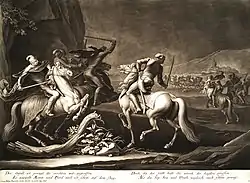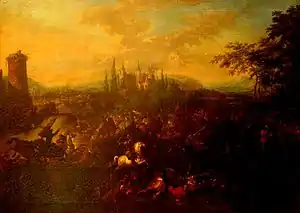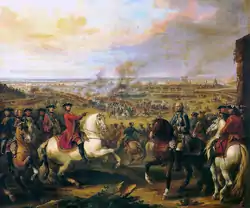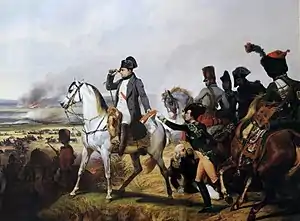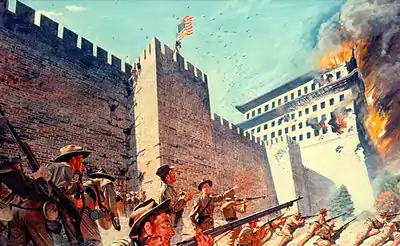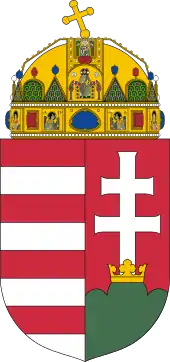List of wars involving Hungary
This is a list of military conflicts in which Hungarian armed forces participated in or took place on the historical territory of Hungary.
Middle Ages
Wars under the Árpád-dynasty's rule
| Date | Conflict | Allies | Enemies | Result |
|---|---|---|---|---|
| around 830 | Hungarian–Khazar War | Hungarian tribes | Khazars | Hungarian victory |
| 894 | Byzantine-Bulgarian War (894) | Hungarian tribes |
First Bulgarian Empire | |
| around 895 – 902 | Hungarian conquest of the Carpathian Basin | Hungarian tribes | East Francia Great Moravia First Bulgarian Empire South Slavic tribes Vlachs |
Hungarian occupation of the Carpathian Basin |
| (836) 862 – 970 | Hungarian invasions of Europe | Hungarian tribes | Kingdom of Italy East Francia West Francia Middle Francia Great Moravia Al-Andalus First Bulgarian Empire Principality of Serbia |
Stalemate |
| 960 | Hungarian-Serbian War (960) | Hungarian tribes | Principality of Serbia | |
| 997 | Koppány's revolt | Principality of Hungary |
Koppány's army | Koppány's defeat |
| 1003 | Stephen I's military campaign against Gyula of Transylvania | Successful campaign | ||
| 1008 (?) | Stephen I's military campaign against Ajtony, a tribal leader in the Banat | Ajtony's army | Successful campaign, Ajtony's defeat | |
| 1017–1018 | Hungarian – Polish war | Stalemate | ||
| around 1018 | Pecheneg attack against Hungary | Pecheneg tribes | Hungarian victory | |
| 1018 | Hungarian – Bulgarian war | First Bulgarian Empire | Hungarian-Byzantine victory | |
| 1030–1031 | Conrad II's military campaign against Hungary | Hungarian victory | ||
| 1041 | Uprising against Peter king | Hungarian nobles | Suppression of Peter king | |
| 1042–1043 | German – Hungarian wars | Hungarian defeat | ||
| 1044 | Henry III's military campaign against Hungary | Peter king and his allies |
Defeat of Aba Sámuel, restoration of Peter | |
| 1046 | War between Peter king and prince Andrew | Andrew I's army Kievan Rus |
Hungarian victory | |
| 1046 | Vata pagan uprising | paganic rebels | Andrew's victory | |
| 1051–1052 | Henry III's military campaigns against Hungary | Duchy of Bohemia |
Hungarian victory | |
| 1056–1058 | German – Hungarian border war | Stalemate, treaty of Marchfeld | ||
| 1060 | Civil war between Andrew I king and his brother, Béla | Andrew I's army |
Béla I's army |
Béla I's victory |
| 1061 | Second paganic uprising | paganic rebels | Uprising suppressed | |
| 1068 | Pecheneg attack against Hungary | pecheneg tribes | Hungarian victory | |
| 1071–1072 | Hungarian – Byzantine war | Hungarian victory | ||
| 1074 | Civil war between Solomon king and his cousins Géza and Ladislaus | Duchy of Bohemia |
Géza's army |
Géza and Ladislaus defeat the armies of Emperor Henry IV. and Solomon |
| 1075 | Henry IV's military campaign against Hungary | Solomon's army |
Hungarian victory | |
| 1085 | Pecheneg invasion of Hungary | pecheneg tribes Solomon's army |
Hungarian victory | |
| 1091 | Pecheneg attack against Hungary | pecheneg tribes | Hungarian victory | |
| 1091 | Hungarian occupation of Croatia | Kingdom of Croatia | Hungarian victory | |
| 1093–1097 | Petar Svačić's Croatian uprising against the Hungarian rule | Kingdom of Croatia | Hungarian victory | |
| 1094–1095 | Ladislaus I's intervention in the polish and bohemish internal conflicts | |||
| 1096 | Coloman king's defensive operations against the different armies of the Peoples crusade | French crusaders | Hungarian victories | |
| 1098–1099 | Coloman's war against the Kievan Rus' | Davyd Ihorevych's army |
Mstyslav Sviatopolkovych's army pecheneg tribes |
Hungarian defeat |
| 1105 | Siege of Zara and occupation of Dalmatia | Dalmatian cities Venice |
Hungarian victory | |
| 1108 | Hungarian war with the Holy Roman Empire | Duchy of Bohemia |
Hungarian victory | |
| 1115–1119 | Hungarian – Venetian wars | Hungarian defeat | ||
| 1123 | Stephen II's intervention in the Kievan Rus' internal conflict | Iaroslav from Vladimir |
Kievan Rus' | Hungarian retreat |
| 1124–1125 | Hungarian – Venetian war | Hungarian defeat | ||
| 1127–1129 | Byzantine-Hungarian War (1127–29) | Serbian Grand Principality |
Stalemate, Peace agreement | |
| 1132 | Hungarian – Polish war [1] | Duchy of Austria |
Hungarian victory | |
| 1136–1137 | Béla II's balcanic campaigns (against Venice and the Byzantine Empire) | Hungarian victory | ||
| 1146 | German – Hungarian war | Duchy of Bavaria Duchy of Austria |
Hungarian victory | |
| 1149–1152 | Géza II's intervention in the conflict between the Principality of Halych and Kievan Rus' | Kievan Rus' |
Principality of Halych | Peace agreement |
| 1148–1155 | Hungarian – Byzantine wars | Serbian Grand Principality |
ceasefire | |
| 1162–1165 | Hungarian civil war between Stephen III and his uncles Ladislaus and Stephen | Ladislaus and Stephen's army |
Stephen III's victory | |
| 1167 | Battle of Sirmium | Banate of Bosnia |
Serbian Grand Principality |
Decisive Byzantine victory, Hungary lost Dalmatia |
| 1168 | Hungarian – Bohemian war | Hungarian victory | ||
| 1180–1184 | Hungarian – Byzantine war | Hungarian victory, Hungary reoccupied Dalmatia | ||
| 1188–1189 | Béla III's military campaign against Halych | Principality of Halych | Hungarian victory Occupation of Halych | |
| 1197–1199 | Civil war between Emeric king and his brother Andrew | Andrew's army | Emeric's victory | |
| 1201–1205 | Emeric's balcanic wars | Grand Principality of Serbia Bosnia |
Hungarian victories | |
| 1202 | Siege of Zara | soldiers of the fourth crusade |
Hungarian defeat | |
| 1213–1214, 1219, 1233–1234 | Andrew II's military campaigns against Halych | Principality of Halych | Hungarian retreat | |
| 1217–1218 | Andrew II's participation in the Fifth crusade | Archduchy of Austria |
Hungarian victories on the battlefields, but city sieges remained unsuccessful. Retreat | |
| 1225 | Andrew II expels the Teutonic Knights from Transylvania, The order had to move to Poland | Hungarian victory | ||
| 1237-1241 | Bosnian Crusade The Hungarian successes were followed by quick Hungarian retreat because of the Mongol invasion of Hungary | "heretics" within the Banate of Bosnia | Stalemate after the quick Hungarian retreat due to the Mongol attacks | |
| 1241–1242 | Mongol invasion of Hungary | mongols | decisive mongol victory | |
| 1242 | King Béla IV's punishing campaign against Frederick II, Duke of Austria | Archduchy of Austria | Hungarian victory[2] | |
| 1243 | Siege of Zara | Hungarian defeat | ||
| 1246 | Battle of the Leitha River | Archduchy of Austria | Hungarian victory | |
| 1250–1278 | Hungarian – Bohemian wars | Duchy of Austria |
Bohemian defeat | |
| 1264–1265 | Internal conflict between Béla IV and his son, Stephen | Stephen's army | Stephen's victory, he got eastern Hungary as a duchy | |
| 1268 | Mačva War Béla IV 's army captures Stefan Uroš I. Their conflict was solved with dynastic marriage. | Béla IV of Hungary | Hungarian victory | |
| 1272–1279 | Feudal anarchy | Csák noble family |
Kőszegi noble family Gutkeled noble family |
Royal victory |
| 1277 | Stefan Dragutin-Stefan Uroš I conflict | Stefan Dragutin |
Stefan Dragutin | |
| 1277 | Hungary's war with the vlach ruler, Litovoi | Litovoi's army | Hungarian victory | |
| 1282 | Cumanic uprising | cumanic tribes | Hungarian victory | |
| 1285 | Second Mongol attack against Hungary | Hungarian victory | ||
| 1291 | German – Hungarian war | Hungarian victory | ||
| 1292–1300 | Andrew III's war with the Kőszegi Hungarian noble family | Kőszegi family | Andrew's victory |
Wars between 1301 and 1526
| Date | Conflict | Allies | Enemies | Result |
|---|---|---|---|---|
| 1301–1308 | Hungarian interregnum, fightings for the country's throne | Duchy of Austria Máté Csák's army László Kán's army |
Duchy of Bavaria Kőszegi Hungarian noble family |
Charles became Hungarian king |
| 1310–1321 | Charles I's wars for the centralized power against the Hungarian aristocracy | Máté Csák Aba family Borsa family Apor family Kőszegi family |
Royal victory, centralization of the Hungarian Kingdom | |
| 1319 | Belgrade and Banate of Mačva | Charles I | ||
| 1322–1337 | Hungarian–Austrian War, restoration of the western borders, defeat of Austria, Kőszegi and Babonić families | Duchy of Austria Holy Roman Empire Kőszegi family Babonić Croatian noble family |
Hungarian victory | |
| 1321–1324 | Hungarian–Serbian War | Bosnia Stephen Vladislav II of Syrmia |
Hungarian defeat | |
| 1330 | Hungarian-Wallachian War | Hungarian defeat in the battle of Posada | ||
| 1347–1349, 1350–1352 | Hungarian-Naples Wars | First campaign: temporary Hungarian victory Second campaign: status quo ante bellum | ||
| 1344 | Louis the Great's invasion and occupation of Wallachia and Moldavia[3] | Hungarian victory, Wallachia and Moldavia became vassal states of king Louis[4] | ||
| 1345–1358 | Hungarian–Venetian War, Venice had to pay annual tribute to Louis. Venetians also had to raise the Angevin flag on Piazza San Marco. | Republic of Venice | Decisive Hungarian victory Treaty of Zadar | |
| 1345 | Hungary's war with the Golden Horde | Hungarian victory, liberation of Moldavia under mongol rule | ||
| 1360–1369 | Louis I's balcanic wars (against Serbia, Bulgaria, Wallachia and Bosnia) | 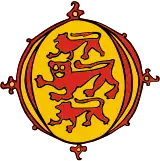 Second Bulgarian Empire Second Bulgarian Empire Bosnia |
Temporary Hungarian victories | |
| 1366–1367 | Hungarian–Ottoman War | Christian victory | ||
| 1372–1381 | War of Chioggia, Hungary defeated the Venetians in several times, and finally expelled Venetians from Dalmatia, however Genoa, Padoa and Austria lost the War. The war resulted in the Treaty of Turin (1381) | Hungarian victory, Venice had to pay annual tribute to King of Hungary | ||
| 1375–1377 | Hungarian–Ottoman War | Hungarian victory | ||
| 1377 | Hungarian - Lithuanian war | Hungarian victory Louis I enters Vilnius[5] | ||
| 1384–1394 | Civil war between a part of the Hungarian nobility and Mary, Queen of Hungary and Sigismund king | Horváti family |
Sigismund's victory | |
| 1391–1396 | Hungarian–Ottoman War | Moravian Serbia |
Christian defeat in the Battle of Nicopolis | |
| 1411–1433 | Hungarian–Venetian War | Republic of Venice | Dalmatia became part of Venice | |
| 1415–1419 | Hungarian–Ottoman War | Stalemate | ||
| 1419–1434 | Hussite Wars | Holy Roman Empire |
hussites | defeat of radical hussites |
| 1428–1432 | War of the South Danube | Armistice | ||
| 1437 | Budai Nagy Antal revolt | transilvanian peasants | Defeat of the rebels | |
| 1437–1442 | Hungarian–Ottoman border conflicts, Ottoman raids in South-Hungary and Transylvania | Hungarian victory | ||
| 1440–1442 | Civil war between Wladyslaw I and Ladislaus | Hungarian nobles |
Cillei family and other Hungarian nobles | Peace agreement, Wladyslaw is accepted as Hungarian king |
| 1443–1444 | Long campaign | Temporary Hungarian victories. | ||
| 1444–1448 | Hungarian–Ottoman War (1444, Crusade of Varna) |
Moravian Serbia |
Hungarian retreat | |
| 1456 | Siege of Belgrade | Hungarian victory | ||
| 1458–1459 | Matthias I's war with Ján Jiskra | Jiskra's soldiers | Royal victory | |
| 1458–1465 | War in Bosnia | A part of Bosnia is occupied by the Ottoman Empire | ||
| 1465–1471 | Hussite uprising in North-Hungary | Czech hussite rebels | Hungarian victory | |
| 1467 | Hungarian - Moldavian war | Moldavia | Hungarian defeat in the battle of Baia | |
| 1468–1478 | Bohemian War (1468-1478) | Kingdom of Bohemia | Treaty of Olmütz, Matthias became king of Bohemia | |
| 1471 | Hungarian - Polish war. King Matthias I forced King Casimir IV to withdraw from Hungary | Kingdom of Poland | Hungarian victory | |
| 1471–1476 | Matthias's intervention in the Moldovian – Ottoman War | Moldavia |
After initial Hungarian-moldavian victories Hungary stopped the advocating of Moldavia, so Stephen III moldavian ruler became vasal of the Ottoman Empire. | |
| 1479 | Battle of Breadfield | Hungarian victory | ||
| 1480–1481 | Battle of Otranto | Christian victory | ||
| 1482–1488 | Austrian-Hungarian War (1477-1488) | Holy Roman Empire | Hungarian victory, capture of Wien in 1485 | |
| 1490–1491 | War of the Hungarian Succession | Kingdom of Bohemia |
Kingdom of Poland | Treaty |
| 1491–1495 | Hungarian – Ottoman war | Stalemate | ||
| 1492–1493 | The Black Army's uprising | Black Army | Destruction of the black army | |
| 1499–1504 | Hungarian – Ottoman war | Stalemate | ||
| 1512–1520 | Hungarian – Ottoman war | Successful defensive operations against the ottomans | ||
| 1514 | Peasants revolt, led by György Dózsa | Peasants | Revolt suppressed | |
| 1521–1526 | Hungarian – Ottoman war (ended with the Battle of Mohács) | Hungarian defeat, destruction of the medieval Hungarian kingdom |
Wars between 1526 and 1699
- 1526–1538: Hungarian campaign of 1527–1528
- 1526–1527: Jovan Nenad uprising
- 1540–1547: Habsburg–Ottoman war
- 1550–1558: Habsburg–Ottoman war
- 1552: Siege of Eger (1552)
- 1562: First Székely uprising
- 1565–1568: Habsburg–Ottoman war
- 1572–1573: Croatian–Slovenian peasant revolt
- 1575: Bekes uprising and the second Székely uprising
- 1593–1606: Fifteen Years' war
- 1610–1664: Habsburg–Ottoman border conflicts
- 1596: Third Székely uprising
- 1611–1613: Transylvanian Civil War and Ottoman military intervention
- 1618–1648: Thirty Years' war
- 1632: Peasants revolt, led by Péter Császár (in Transylvania and in the Royal Hungary)
- 1636: Transylvanian – Ottoman war
- 1656–1657: Transylvanian military campaign against Poland
- 1657–1662: Ottoman–Transylvanian war
- 1663–1664: Austro-Turkish War (1663–64)
- (1672) 1678–1685: Thököly uprising
- 1683–1699: Great Turkish War
- 1697: Hegyalja uprising
Wars between 1700 and 1900
- In rebellion against Bavaria
Wars in the 20th century
| Conflict | Belligerents | Result | |||
|---|---|---|---|---|---|
| Date | Name | Allies | Enemies | Outcome | |
| 28 July 1914 – 11 November 1918 | World War I
 Austro-Hungarian mountain corps in Tyrol |
Central Powers |
Allied Powers Co-belligerents |
Defeat
| |
| December 1918 – June 1919 | Hungarian–Czechoslovak War | Military VictoryPolitical Defeat
| |||
| 13 November 1918 – 3 August 1919 | Hungarian–Romanian War
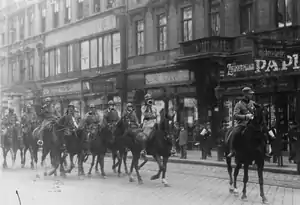 Romanian cavalry march through Budapest, 1919. |
Defeat
| |||
| 3 August – 13 October 1921 | Uprising in West Hungary | (disarmament of the rebels in 1921) |
Victory
| ||
| 23 – 31 March 1939 | Slovak-Hungarian War | Victory
| |||
| 1 September 1939 – 2 September 1945 Hungary entered: 27 June 1941 Hungary exited: 11 May 1945 |
World War II
 Hungarian Arrow Cross militia and a German Tiger II tank in Budapest, October 1944  Hungarian Toldi I tank used during the 1941 invasion of the Soviet Union |
Axis Powers Affiliate states Client States Co-belligerents Active neutrality |
Allied Powers In exile for part of the war Other important belligerents Co-belligerents
|
Defeat
| |
| 23 October – 10 November 1956 | Hungarian Revolution of 1956
_t%C3%A9r_a_Vay_%C3%81d%C3%A1m_utca_fel%C5%91l_a_N%C3%A9psz%C3%ADnh%C3%A1z_utca_fel%C3%A9_n%C3%A9zve._Fortepan_23577.jpg.webp) The flag, with a hole where the communist coat of arms had been cut out, became the symbol of the revolution. |
Defeat
| |||
| 20 – 21 August 1968 | Warsaw Pact invasion of Czechoslovakia
Horici_sovetsky_tank.jpg.webp) Soviet tanks with invasion stripes in Czechoslovakia, 1968 |
Warsaw Pact supported by |
Victory
| ||
21st century
| Conflict | Belligerents | Result | |||
|---|---|---|---|---|---|
| Date | Name | Allies | Enemies | Outcome | Losses |
| March 2003 - 2009 | Iraq War |
Iraqi National Congress |
For fighting between insurgent groups, see Civil war in Iraq (2006–07). |
Victory
|
12 wounded. |
| 7 October 2001 - Present Day | War in Afghanistan (2001–present) | Ongoing
|
14 wounded. | ||
See also
References
- Bierter Band (1821). War and Technology. Heuber. p. 299-302.
- Oxford University (2010). The Oxford Encyclopedia of Medieval Warfare and Military Technology: Vol. 1. Oxford University Press. p. 33. ISBN 9780195334036.
- Ion Grumeza: The Roots of Balkanization: Eastern Europe C.E. 500-1500, University Press of America, 2010
- Robert Maddock (2016). The 1,300 Years’ War: Volume One. Xlibris Corporation. p. 449. ISBN 9781524533762.
- Liviu Pilat; Ovidiu Cristea (2017). The Ottoman Threat and Crusading on the Eastern Border of Christendom During the 15th Century. Brill Publishers. p. 67. ISBN 9789004353800.
- Tuchman, 548
- Left the war after signing the Peace of Basel with France.
Sources
- Gyula Kristó; Ferenc Makk (1996). Az Árpád-ház uralkodói (in Hungarian). I.P.C. Könyvek. ISBN 978-963-7930-97-3.CS1 maint: ref=harv (link)
- Magyar Tudományos Akadémia (1987). Magyarország története: Elozmenyek es Magyar tortenet 1242-IG. Akadémiai Kiadó.CS1 maint: ref=harv (link)
This article is issued from Wikipedia. The text is licensed under Creative Commons - Attribution - Sharealike. Additional terms may apply for the media files.
